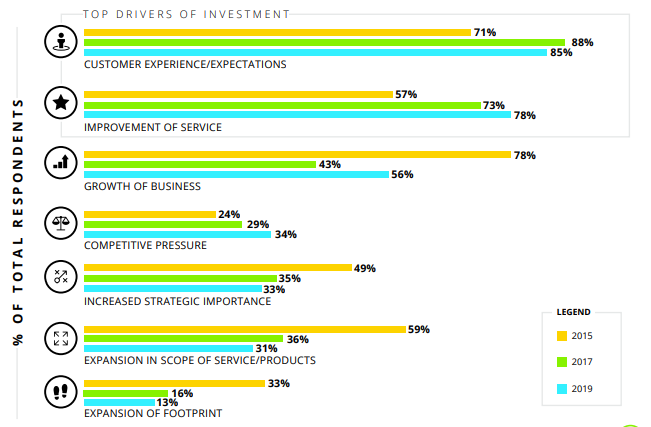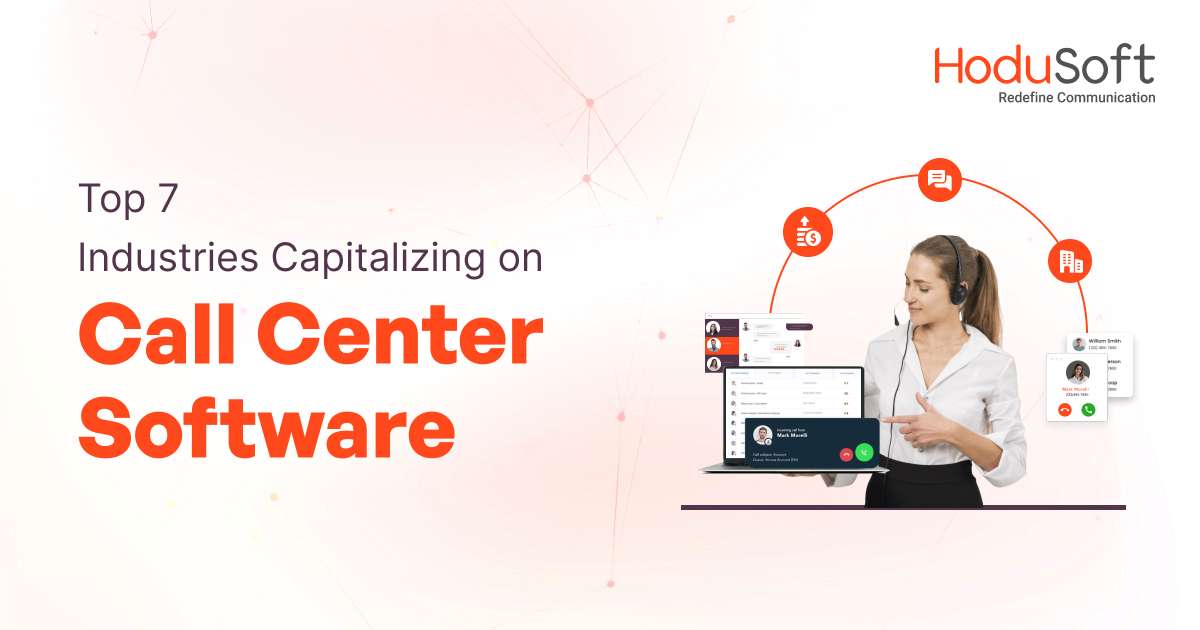Top 7 Industries Capitalizing on Call Center Software
Customer care is the new sales engine for companies now. Coming out of the shadows which harped on the three factors—lowering labor cost, optimizing service, and achieving the right mix of offshoring, customer care has now taken the driver’s seat.
Discerning customers favors companies showing that they truly “care”, giving them a competitive edge. There are top industries capitalizing on call center software for better business operations.
The digital medium of communication is probably the biggest catalyst to bring customers closer to companies. Now they voice their concerns on social media, which sees an outpouring of sentiments from other customers too. Within minutes a company’s reputation receives blows.
The world of business is moving towards agility, accelerated by the Covid-19 pandemic. Companies are adopting transformation strategies to catch up with the changing customer expectations. The gatekeeper of customer service is often the call center system in an organization.
A global survey by Deloitte highlights the trend in investment for call and contact centers. A majority (85%) of leaders in the industry think customer experience will drive future investments with a focus on improving service.

Ushering in the Change in Customer Service
Most industries have made advances to make long-term changes in their call center operations by upgrading to internet-based or (VoIP) call center software. The VoIP (Voice Over Internet Protocol) infrastructure offers an easy and cost-effective channel for call center software for small and large businesses.
The no-hassle deployment over the cloud also makes VoIP the best call center software. Nearly all sectors are moving towards lean call center technologies, however, some need it for more than others. Let’s take a closer look at them.
Historical Context of Call Centers
In the historical context of call centers, it’s fascinating to note that the roots of this essential business function can be traced back to the mid-20th century. Initially, call centers were relatively simple operations, often referred to as “telephone exchanges” or “switchboards”.
These early call centers were primarily responsible for connecting incoming and outgoing calls manually, using a network of operators who physically plugged and unplugged telephone lines.
Over time, call centers started taking on more specialized roles, such as handling customer inquiries, managing reservations, and providing technical support. They became indispensable for industries like telecommunications, airlines, and utilities, which needed a centralized hub to manage customer interactions efficiently.
Transition from Traditional Call Centers to Modern Solutions
The evolution of call centers took a significant leap forward with the advent of computer technology in the latter half of the 20th century. The 1970s saw the introduction of Automatic Call Distributors (ACDs), which automated the routing of incoming calls to available agents based on predefined criteria. This innovation greatly improved call center efficiency and reduced caller wait times.
In the 1990s, Interactive Voice Response (IVR) systems and Computer Telephony Integration (CTI) became widespread. IVRs allowed callers to interact with automated menus using their touch-tone phones, while CTI facilitated the integration of call center systems with customer databases, enabling agents to access relevant information quickly.
However, it was the late 1990s and early 2000s that witnessed the most transformative changes in call center technology. The proliferation of the Internet and the development of Voice over Internet Protocol (VoIP) enabled the emergence of virtual call centers. Agents could now work from remote locations, and businesses started adopting cloud-based call center solutions.
Today, the transition from traditional brick-and-mortar call centers to modern, cloud-based solutions is nearly complete. This shift has brought about numerous advantages, including cost savings, scalability, and flexibility.
Companies no longer need to invest heavily in physical infrastructure, and agents can work from anywhere with an internet connection, leading to a more diverse and flexible workforce.
Role of Technology in Reshaping Call Center Operations
Technology has played a pivotal role in reshaping call center operations throughout its evolution. Some key ways technology has impacted call centers include:
Automation:
Modern call center software automates many routine tasks, such as call routing, data entry, and call logging. This frees up agents to focus on more complex customer interactions, enhancing productivity.Data analytics:
Advanced analytics tools allow call centers to gather insights from customer interactions. By analyzing call data, businesses can identify trends, customer preferences, and areas that need improvement, leading to better decision-making.Omnichannel support:
With the rise of digital communication channels like email, chat, and social media, call centers have expanded their scope to offer omnichannel support. Technology enables seamless integration of these channels, ensuring a consistent customer experience.AI and chatbots:
Artificial Intelligence (AI) and chatbots have become increasingly common in call centers. They can handle routine inquiries, provide quick responses, and even assist agents by suggesting solutions or pulling up relevant information.Personalization:
Technology allows call centers to access customer information quickly, enabling agents to personalize interactions. Customers appreciate this tailored approach, leading to higher satisfaction and loyalty.
Industries That are Revolutionized by Call Center Software
Since its advent, call center software has revolutionized many industries.
1. BPO
Business Process Outsourcing (BPO) is an industry that focuses both on internal processes and customer communication in a company. BPO has its roots in the manufacturing industry, where manufacturers hired third-party vendors to handle parts of their supply chains after determining that the vendors could bring more skills, speed and cost efficiencies to those processes than an in-house team could deliver.
Call center agents to manage the phone support of the company, both inbound and outbound processes. The immediacy of a phone conversation with a human builds trust between a customer and the service agent.
Based on a Grand View Research study in 2022, the global BPO service market share is estimated to reach USD 525.2 billion by 2030, registering a CAGR of 9.1% over the forecast period (2022-2030).
Call center software allows BPO companies to scale their operations up or down rapidly to meet client demands. Traditional call centers often required significant lead time and resources to expand, while modern software-based solutions can be adjusted with ease. This scalability ensures that BPOs can accommodate fluctuating workloads and serve clients more efficiently.
One of the most noticeable impacts of call center software in the BPO industry is cost savings. Cloud-based solutions eliminate the need for extensive physical infrastructure, such as expensive on-premises equipment and office space. This reduces overhead costs significantly, allowing BPO companies to offer competitive pricing to their clients.
Call center software enables BPOs to tap into a global talent pool. Agents can work remotely from various locations, which not only expands the available talent but also allows BPOs to offer services in multiple time zones. This global access ensures 24/7 support and improves the customer experience.
2. Healthcare and Telemedicine
A digital and high-tech customer interaction model can help to increase revenue and gain market share in the competitive healthcare market. Today customer service is the biggest differentiator for all the market players. For the healthcare industry, a call center offers the advantage of providing a centralized system for a distributed network.
Several healthcare companies have a large presence with hospitals located at several places, physician practices, diagnostic clinics, etc. Other than clinical interaction, other communication also takes place.
Each interaction matters as patients place immense faith in their healthcare professionals. A patient, when diagnosed with any small infection to any major disease, expects personalized care. So, when the hospital staff offers him personalized services through multiple communication channels, he feels valued.
Most healthcare players now use call center technology in order to offer better customer service to their patients. Patients can choose their preference of communication, appointment notifications, billing details, etc. for intimation by mail or phone.
With narrowing operating costs, increasing competition, and thin margins, patient service and care will remain critical factors with call centers playing a pivotal role in relaying messages and keeping a direct channel of communication open. Call center software has empowered healthcare providers to engage with patients more effectively.
Appointment reminders, prescription refill notifications, and follow-up calls can all be automated, ensuring patients stay on top of their healthcare needs. This has led to improved patient adherence and overall health outcomes.
Telemedicine call centers equipped with specialized software enable patients to access medical advice and consultations around the clock. This is especially valuable in emergencies or for patients with urgent health concerns, eliminating the need for physical visits to healthcare facilities.
Call center software assists in patient triage and prioritization based on the severity of their condition. Advanced routing algorithms ensure that urgent cases are directed to appropriate medical personnel promptly, optimizing resource allocation.
3. Automotive
With the call center software, automobile companies can unlock operational value. Customers are most likely to come back to the companies that offer post-sales services like vehicle maintenance from time to time, selling spare parts, etc.
So, contact center software helps with everything from calling the customer for their maintenance service, offering them specialized discounts on spare parts, wishing customers on their special days, and many more.
One of the primary benefits of contact center software in the automotive sector is its ability to facilitate proactive customer engagement. Instead of waiting for customers to initiate contact, companies can use the software to schedule and automate calls for vehicle maintenance services.
This not only ensures that vehicles are well-maintained but also strengthens the bond between the customer and the brand.
According to a survey by JD Power, proactive maintenance reminders result in a 15% increase in customer satisfaction and a 10% higher likelihood of repeat business.
Beyond proactive engagement, contact center software serves as a centralized platform for customers to report issues or seek assistance.This streamlined approach to issue resolution enhances customer satisfaction and contributes to the overall positive perception of the brand.
Moreover, as per a study by Automotive News, companies that efficiently resolve post-sales issues through dedicated customer support see a 20% improvement in customer retention.
Contact center software allows automotive companies to tailor their communication by offering personalized discounts on spare parts, accessories, or even exclusive service packages.
This personalized approach not only adds value to the customer experience but also boosts the chances of repeat business.
4. Telecommunication
The telecom industry is marred by stiff competition as low prices and internet services have become a trend. To stay a step ahead of its competitors the only differentiating factor is customer service. Else, customers do not hesitate to change their operators as the supply is aplenty.
In the telecom industry, where consumers depend on their phones for both personal and professional needs, customer service holds immense importance. Customers often seek information about service outages, billing inquiries, plan changes, and more.
Given the ubiquity of smartphones and the reliance on seamless connectivity, telecom companies receive an avalanche of incoming calls daily. In this scenario, efficient and effective customer service becomes not just a luxury but a necessity.
A report by Statista highlights that 71% of consumers are willing to switch telecom providers due to poor customer service experiences.
Customers often enquire about service outages, bills, etc as the phone is essential nowadays. With such rampant use and huge customer bases, phone companies receive thousands of incoming calls per day. A call center software streamlines tasks and is vital to handle call volumes.
Telecom companies experience surges in call volume during service disruptions or when new plans are introduced. Call center software is instrumental in handling these fluctuations, ensuring that customers are not left waiting and their issues are addressed promptly.
Today’s customers demand flexibility in communication. Call center software offers a range of channels, including voice calls, email, live chat, and social media, enabling telecom companies to engage with customers through their preferred methods.
5. Banking and Financial Services
Banking and financial services are always crucial in today’s world. Everyone now has a banking relationship with their preferred banking services provider. The banking and financial industry makes the best use of call center software for the management and maintenance of loan offerings, policy inquiries regarding various taxes, government rules and updates, among others.
Automation through call center software helps make banking and financial services accessible and faster. The service agents are also assured of their communication with the ready-to-access information available at their fingertips while interacting with the customers.
Important in-built tools such as call recording, and conversation history have also become important as banks can refer to them and store them for the future.
Call center software has enabled banks and financial institutions to provide exceptional customer service. Agents equipped with comprehensive customer profiles and transaction histories can resolve inquiries, process requests, and address issues more efficiently, leading to higher customer satisfaction.
Banking and financial call centers are now capable of offering round-the-clock support, ensuring customers can access assistance and information at any time. This level of availability is crucial for addressing urgent financial matters and serving global customers in different time zones.
Call center solutions allow banks to offer personalized financial advice and recommendations based on customers’ financial profiles and goals. This level of customization enhances the customer experience and fosters long-term relationships.
Call center software helps financial organizations adhere to stringent regulatory requirements. Features like call recording, encryption, and access controls ensure that sensitive financial information is handled securely and in compliance with industry regulations.
6. Restaurants and Food Services
Restaurants and the food service industry today operate at a large scale. To improve the customer experience, it is a must for them to stand up to a level where it is easy for the customers to reach the restaurants and share their feedback, complaints, suggestions, etc. This holds high significance now as customers go social to voice their opinion.
In dining and food services, customer satisfaction and engagement are paramount. Customers today expect seamless and memorable experiences when dining out or ordering food.
They also have the means and platforms to voice their opinions and influence others’ dining choices through social media reviews and recommendations. Therefore, creating a strong and positive customer engagement strategy is pivotal for restaurant success.
According to a survey by Deloitte, 62% of customers believe that restaurants should be using technology to enhance their dining experience.
The call center software can store the customer data who visit regularly and share their feedback with the restaurant owners to make corrective decisions to win the competition through offering great customer service.
7. Travel and Transportation
Like the restaurants and food services industry, the travel and transportation industry can only stay competitive with their customer service. Call center software is widely utilized by this industry.
The contact center software makes many tasks simple and quick such as offering travel deals, solving traveler issues, flight bookings, cancellations, typo errors in flight tickets, etc.
In an age when travelers demand convenience, efficiency, and top-notch service, customer service becomes a defining factor for businesses in the travel and transportation sector.
Whether it’s booking a flight, resolving a travel issue, canceling reservations, or correcting typographical errors on flight tickets, customers seek swift and effective solutions. Moreover, with the power of social media, a single positive or negative experience can reach a global audience, making customer service a mission-critical aspect of the industry.
According to a study by McKinsey, 87% of travelers believe that excellent customer service is a key factor when choosing a travel or transportation provider.
Call center software allows travel and hospitality businesses to efficiently handle booking inquiries and reservation management. Agents can access real-time availability and pricing information, make bookings, and modify reservations quickly, resulting in enhanced customer satisfaction and reduced booking errors.
All said and done,
These are the top 7 industries that have already taken the leap. They are the largest users of call center software to win customers and stand out of the tight competition.
A call center can help you increase your market share by helping you find product differentiators and discerning from the competition. This is an edge you cannot let go of in today’s customer experience-centric world.
Check out HoduSoft’s easy-to-deploy call center solutions for all sizes of business. We can help you take your service levels higher by simple automation at unmatched value.



